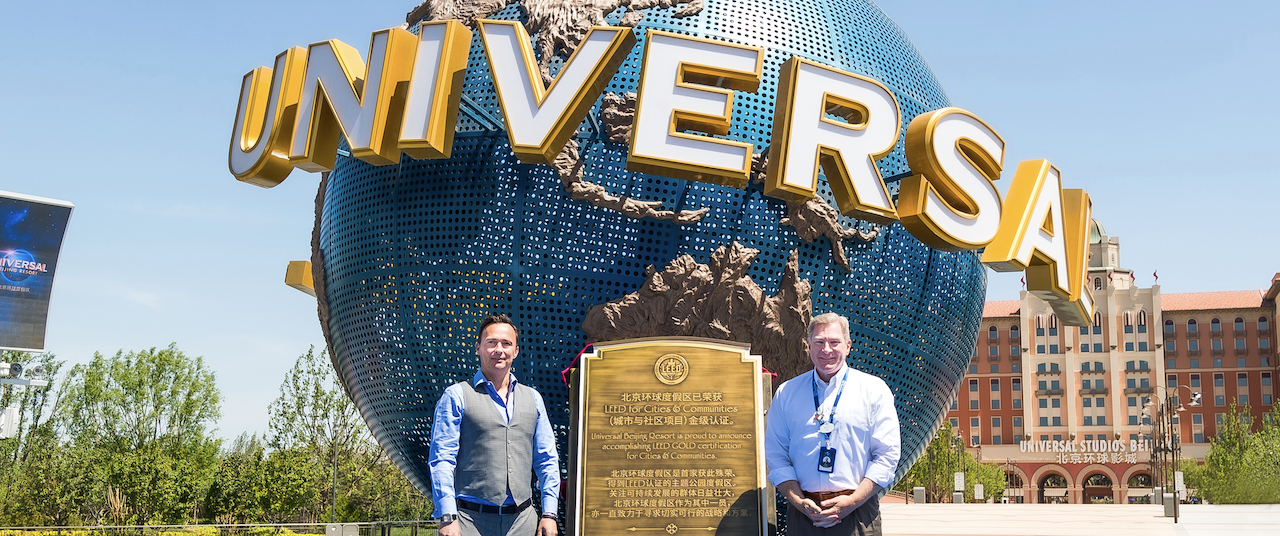As Universal Studios Beijing prepares for its grand opening, the resort has been honored for its environmental impact. Universal Beijing Resort has been certified LEED Gold under the LEED [Leadership in Energy and Environmental Design] for Cities and Communities rating system, becoming the world's first theme park resort to earn that rating.
According to the resort, LEED for Cities and Communities evaluates development for natural systems and ecology, transportation and land use, water efficiency, energy and greenhouse gas emissions, materials and resources, and quality of life. Universal Studios Beijing was noted for including 420 acres of green space, plans to reclaim more than than 713 million gallons of water a year and greenhouse gas emissions less than half of the allowed per capita requirement in the LEED Cities and Communities Standard.
The resort also features new public transit support, including a metro station for two lines, plus new bus stops and routes and electric shuttle buses for team members. The resort also said that it has built on-site housing for more than 8,000 team members, each of whom will have their own room, further reducing traffic and emissions.

"We have worked to plan and create a theme park resort destination that is good for the environment, good for our guests and team members and good for our community," General Manager Tom Mehrmann said. "This is an ongoing effort that will continue long after certification. Our guests, team members and community residents will directly benefit from what we are doing."
Universal Beijing Resort will open with two hotels - Universal Studios Grand Hotel and NUO Resort Hotel - a CityWalk dining and shopping area and the Universal Studios Beijing theme park. The park will feature the following lands and attractions:
Hollywood Boulevard
Transformers Metrobase
Kung Fu Panda Land of Awesomeness
Waterworld
Jurassic World
The Wizarding World of Harry Potter
Minion Land
Universal Beijing Resort is set to open this summer, though soft openings have been tipped for as early as this month.
* * *
We wanted you to read this article before we make our newsletter pitch, unlike so many other websites. If you appreciate that - and our approach to covering theme park news - please sign up for our free, twice-a-week email newsletter. Thank you.
This article has been archived and is no longer accepting comments.
I don't want to rain Universal's parade here, but as someone who's worked on LEED certification projects in the past, the process to earn certification is a bit of a joke. The process evaluates the entire project from start to finish to determine the level of certification. Putting up a sign in front of a dozen parking spots stating they're reserved for hybrid/alternate fuel vehicles can often be a tipping point between the next level of LEED certification. Setting aside parking spots at a theme park for alternate fuel vehicles does NOTHING for the environment, yet is valued as one of the highest impact mitigations (that costs virtually nothing) in the LEED certification process.
I certainly think that LEED certification gets PMs and staff thinking about ways to reduce the impact of a project on the environment, but there are so many offsets and credits that make it more of a game than an honest effort from project teams to design and develop an environmentally friendly project. When using an electric forklift for a single day during construction instead of a CNG forklift can vault a project from LEED-GOLD to LEED-PLATINUM, you have to question whether the certification process is really valuable, especially considering the labor and effort involved in submitting for LEED certification.
Also, earning LEED certification is a costly process that has to be built into a project from the start. There are probably thousands of projects around the world that are completed every single year that would be LEED certified, but those teams didn't want or need to spend the money to submit their projects for certification. The LEED process gives you a nice placard to hang on the wall, but just because one building has one and another doesn't, doesn't necessarily mean the LEED-certified building is more environmentally friendly.
This is why numerous proposed policies to create a "carbon tax" system for businesses (and eventually extending to individuals) would never work, and would do little to actually help the environment, because those with the resources to figure out the loopholes would circumvent the tax with reckless abandon.